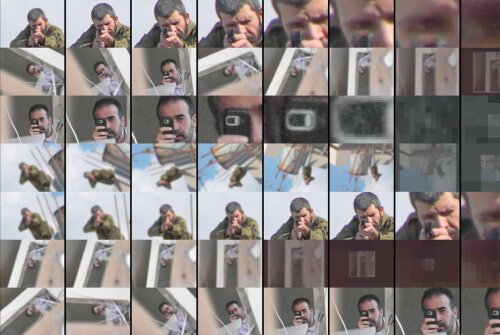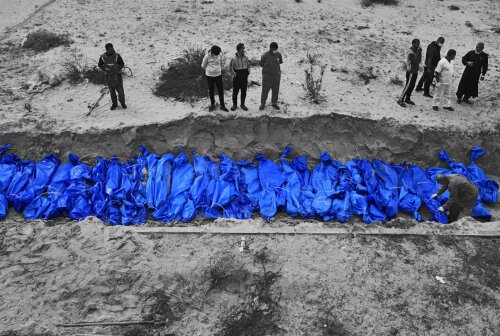On the occasion of his doctoral defence, Arkadi Zaides invites external jury members Rabih Mroué and Yumna Masarwa to share their respective practice with students, researchers and a wider audience.
18 December 2025 - Studio laGeste, Ghent
- 10:00-13:00
- Location: Studio laGeste, Bijlokesite, Bijlokekaai 7, B - 9000 Ghent
- Info: https://www.lageste.be/en/news/towards-documentary-choreography-by-arkadi-zaides
- Free entrance
“Shot/Counter Shot: Rethinking the Reverse” by Rabih Mroué
This lecture revisits the classical definition of the shot/counter shot technique, with a focus on instances where the reverse is internalized within a single frame. Rather than relying solely on traditional editing patterns, I explore alternative strategies that challenge conventional cinematic grammar; by analyzing these variations, I aim to open up new ways of thinking about point of view, relational space, and narrative construction. I further reflect on the term shoot, examining the kinds of connections that can be drawn between acts of war-making and image-taking. I share documents and
examples from both my own work and that of other artists and video-makers, expanding this inquiry through concrete case studies that expose the political and aesthetic implications of these practices.

Rabih Mroué, born in Beirut and currently living in Berlin, is a theatre director, actor, visual artist, and playwright. Rooted in theatre, his work extends to video and installation art, continuously exploring alternative and contemporary relationships among the different elements and languages of performance. He is a contributing editor for The Drama Review / TDR (New York) and a co-founder and board member of the Beirut Art Center (BAC). He was a fellow at the International Research Center: Interweaving Performance Cultures / FU Berlin from 2013–2014 and served as a theatre director at Münchner Kammerspiele (Munich) from 2015–2019. Mroué has performed and exhibited internationally, including at dOCUMENTA (13) – Kassel, CA2M Centro de Arte Dos de Mayo – Madrid, The ICP Triennial and MoMA – New York, Centre Pompidou – Paris, SALT – Istanbul, and Reina Sofía – Madrid, among others. His works include Four Walls and a Roof (2024), Hartaqāt (2023), Sunny Sunday (2020), Borborygmus (2019), So Little Time (2016), Ode to Joy (2015), Riding on a Cloud (2013), 33 RPM and a Few Seconds (2012), The Inhabitants of Images (2008), Who’s Afraid of Representation (2005), Looking for a Missing Employee (2003), and others.
“Re(Making) Death in Gaza: The Dead Body as a Site of Agency and Sumūd (Steadfastness)” by Yumna Masarwa
The recent war on Gaza has rendered impossible the enactment of funerary rites and the provision of dignified burial for the deceased, fundamentally disrupting the structure of death itself. This talk examines how Gazans respond to this annihilation of death’s structure, how they make sense of the brutal scenes of death and dismemberment that have become part of daily life, and how they grieve amid mass casualties and the absence of traditional funerary rituals. Foregrounding Gazan voices and centering the victim as both witness and paradoxical agent—whose dispossession paradoxically generates the power to speak—this study challenges Western theoretical frameworks that position death rituals as essential to social cohesion and predict social collapse in their absence (Hertz, 1960; Huntington & Metcalf, 1991; Turner, 1969; Van Gennep, 1960). I argue instead that in Gaza, the destruction of the structure of death has generated social cohesion through sumūd (steadfastness). I also propose the concept of shahāda (martyrdom) understood as an idea of agency and collective grief, which serves as a critical lens for interpreting the interrelation between mourning, resistance, and communal identity under conditions of systematic violence. Taken together, these two concepts found an argument for the necessity of an Indigenous theoretical framework in order to understand Gazan experiences of grief.

Yumna Masarwa (PhD, Princeton University), born in Israel-Palestine and living in Aix-en-Provence, is the Dean of the School of Art at the American College of the Mediterranean (ACM-IAU) in Aix-en-Provence (France), a Visiting Research Fellow at the Centre for Death and Society (CDAS) at the University of Bath (UK), and a Project Team Member of the Thanatic Ethics research project on the Circulation of Bodies in Migratory Spaces. Her art-historical research, which combines primary sources with material culture, focuses on artistic encounters in the Mediterranean and explores artistic exchanges between the Islamic World and Europe. Her work has been published in Antiquité Tardive, Al-Usur al-Wusta: The Bulletin of Middle East Medievalists, Excavations and Surveys in Israel, and in edited volumes such as Housing the Holy: Shrines in Ritual Architecture and A Cultural History of the Middle East and North Africa in Late Antiquity (Bloomsbury, forthcoming). Since 2018, she has been carrying out multi-sited ethnographic research in Marseille, focusing on burial and body repatriation among Algerians; the role of French Muslim women in organizing funerals and burials (feminizing funeral activities); and Muslim tombs in French cemeteries. In addition, she has been working on “Death in Gaza” since the war started in October 2023. Some of her research has been published in Nouvelles Études Francophones, Comparative Studies of South Asia, Africa and the Middle East (CSSAAME), Études sur la Mort, and Death Studies (forthcoming).